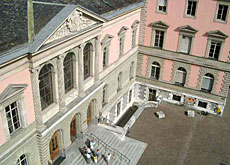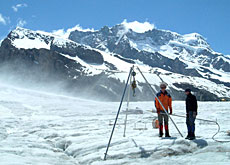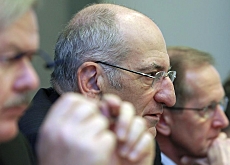Universities face public examination

The public will have its say on the Swiss university system this weekend after a year that has seen the world of higher education rocked by a series of scandals.
Swiss voters are due to decide on Sunday on a package of education reforms, including changes to the way universities are run.
Over the past 12 months separate investigations have been launched into suspected financial irregularities at four of the country’s leading academic institutions.
Ahead of the vote, Charles Kleiber, state secretary for education and research, told swissinfo that the incidents had left a stain on Switzerland’s reputation and said it was time for a shake-up.
“I am saddened by these scandals which are not good for the image of our universities,” he said.
“There has been a lack of accountability and these affairs should enable us to tighten controls,” he added.
Under Switzerland’s federal system, universities are independently run and answer only to their canton.
Proposed changes to the constitution, which are supported by the cabinet and a large majority of cantons, would see regional authorities working closer together and the government playing a bigger role.
The academic world, which admits there is a need for reform, is jealously protective of its independence.
Rectors Conference of Swiss Universities, while not trying to play down the incidents, believes that it is simply a matter of bad luck that a succession of scandals surfaced one after another.
“But they are very unfortunate since they call into question the honesty of members of the university community,” said Jean-Marc Rapp, the body’s president.
Allegations
In the latest incident to surface, the head of the neurology department at Lausanne University Hospital was accused last month of embezzling up to SFr2.1 million ($1.74 million).
Geneva University is also in trouble. An audit uncovering false expenses claims hit the headlines a month ago. It also emerged that the university had used for its own ends a subsidy from the cantonal authorities earmarked for Aids research.
Last year the head of the research foundation at the Federal Institute of Technology in Zurich was found to have banked almost SFr1 million for consulting work. An investigation found that nothing illegal had taken place, but changes have since been made to working practices.
An investigation has also been launched at the Federal Institute of Technology in Lausanne, where a professor is suspected of embezzling at least SFr160,000.
“Where there is money, there are thieves; but where there are thieves, there are penalties,” said Kleiber. “There will be sanctions and this will enable the university system to bounce back.”
Control mechanisms
Rapp, who is also the rector of Lausanne University, admits that the present situation is far from perfect but points out that it is “the universities’ control mechanisms that ensured these affairs came to light”.
“As with any organisation with a slightly complicated structure, you have to find a balance between trust and control,” he argued.
However, Kleiber says universities need to get a grip on the situation and assume their responsibilities.
“What is happening is above all down to a lack of managerial control,” he said. “Leadership, coupled with the need for results, is a condition for the independence of these institutions.”
For some, the series of scandals comes at a particularly inopportune moment as they feel it could influence the government’s response to the Swiss National Science Foundation’s appeal for a 48 per cent budget increase for 2008-2011.
For others, the timing couldn’t be better since the government is in the process of reviewing the whole university system.
swissinfo, Isabelle Eichenberger
The two federal institutes (Zurich and Lausanne) answer directly to the government.
The country’s ten universities are controlled and financed by the canton in which they are located. They receive funding from other cantons as well as a government subsidy.
Some university activities are financed by the Swiss National Science Foundation and the European Union. Universities also received funding from foundations and private business. A student tax covers 3-4% of the budget.
Seven specialist higher education institutions get a third of their funding from the government, with the rest made up by the cantons.
The ten universities and two federal institutes of technology cost SFr5.425 billion in 2004.
Education ate up SFr1.46 billion and research, SFr2.87 billion.
During the winter term 2005/06 there were a record 166,000 students in higher education.

In compliance with the JTI standards
More: SWI swissinfo.ch certified by the Journalism Trust Initiative


You can find an overview of ongoing debates with our journalists here. Please join us!
If you want to start a conversation about a topic raised in this article or want to report factual errors, email us at english@swissinfo.ch.